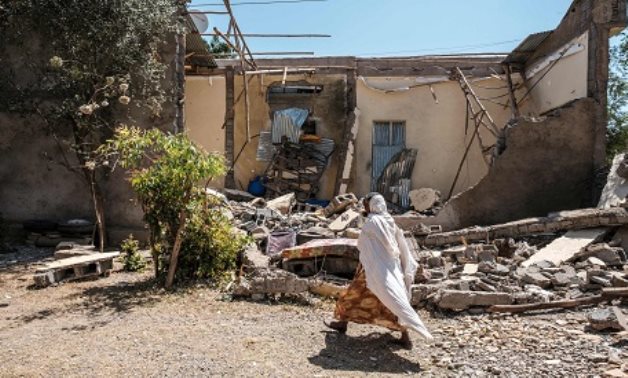
A woman walks in front of a damaged house which was shelled as federal-aligned forces entered the city, in Wukro, north of Mekele, on March 1, 2021 AFP
CAIRO – 7 July 2021: In a phone call Tuesday, U.S. Secretary of State Antony Blinken called on Ethiopian Prime Minister Abiy Ahmed to withdraw the forces of Amhara (a major ethnicity in Ethiopia) and neighboring Eritrea from Tigray region in alignment with the guidelines issued by the UN Security Council on the matter last week.
The state secretary also urged all parties to achieve an "immediate and indefinite ceasefire" in the region lying northern the country on the borders with Sudan, as reported by Reuters. Further, he asserted the importance of setting a mechanism that would hold culprits of atrocities and human rights violations accountable.
The armed conflict between Tigray people and the forces of the federal government incurred thousands of death, and the displacement of two million individuals, including 50,000 who fled to Sudan. That is in addition to putting 400,000 at the risk of famine.
"That unilateral announcement needs to be followed up with concrete changes on the ground to end the conflict, to stop the atrocities and importantly to allow safe and unhindered humanitarian assistance," State Department spokesman Ned Price told reporters at a regular news briefing.
The Tigray People's Liberation Front (TPLF) rejected the unilateral ceasefire declared by Ethiopia's central government after the former had recaptured the region's capital, Mekelle, on June 28, as reported by CNN.
The government forces had seized the city in November while the Cabinet approved in May a proposal to designate the TPLF and Oromo Liberation Front-Shene (OLF-Shene) terrorist organizations.
The move is considered a serious escalation given that the TPLF was once part of the ruling regime in Ethiopia.
According to a CNN news report, the fighting destroyed bridges, roads, farms, and power plants incurring electricity outage and cut of water supply to houses. Also, the electricity outage disabled banks from operation denying citizens access to money.
UN Spokesperson Stephane Dujarric stated that the United Nations Food Program (UNFP) resumed some of its work in the region in the aftermath of the fighting suspension. Yet, he warned that humanitarian work there is still at stake because of the lack of access to electricity, telecommunications, banking services, and roads connecting Tigray with other Ethiopian territories. As a consequence, a soon famine is looming.
The TPLF got marginalized since Ethiopia's Prime Minister Abiy Ahmed took office in 2018 prompting its ministers in the federal government to resign. Also, the Ethiopian People's Revolutionary Democratic Front (EPRDF) – of which the TPLF and entities representing other regions – got dismantled.
The TPLF governing the region housing more than five million people had tensions with the federal government after the prime minister had called off elections scheduled for August 2020.
As a result, the region's government held elections in the region in September 2020. As a consequence, the federal government refused to approve of the results of such elections. Equally, Tigray's government considered Ahmed's government illegitimate since October 5 calling on him to resign and advocating for the formation of an interim government until elections are held.
It is noted that half of members of the Ethiopian Armed Forces are affiliated to the TPLF, which possesses 70 percent of missiles, and anti-aircraft warfare.
On October 31, the Ethiopian Army issued a firm statement after Deputy Commander of the Northern Military Zone Gamal Mohamed had been captivated upon arrival to the region before he was released.
A large number of Tigray military commanders expelled by Ahmed from the Ethiopian Armed Forces and other security agencies have been training elements to defend the ethnicity.
On November 4, Abiy Ahmed launched military operations against the Tigray Region. Atrocities occurred, and 950,000 got displaced. Of those, 50,000 fled to Sudan.
The attacks were carried out by the Ethiopian Armed Forces and the special forces of Amhara Region. Eritrean forces have amassed on borders with Tigray, and reportedly took part in the aggression. Yet, Eretria's authorities deny the allegations.
It is noted that Late Ethiopian Prime Minister Meles Zenawi whose rule extended from 1995 until his death in 2012 belonged to Tigray and was – while in office – leader of the TPLF and the EPRDF.
Comments
Leave a Comment